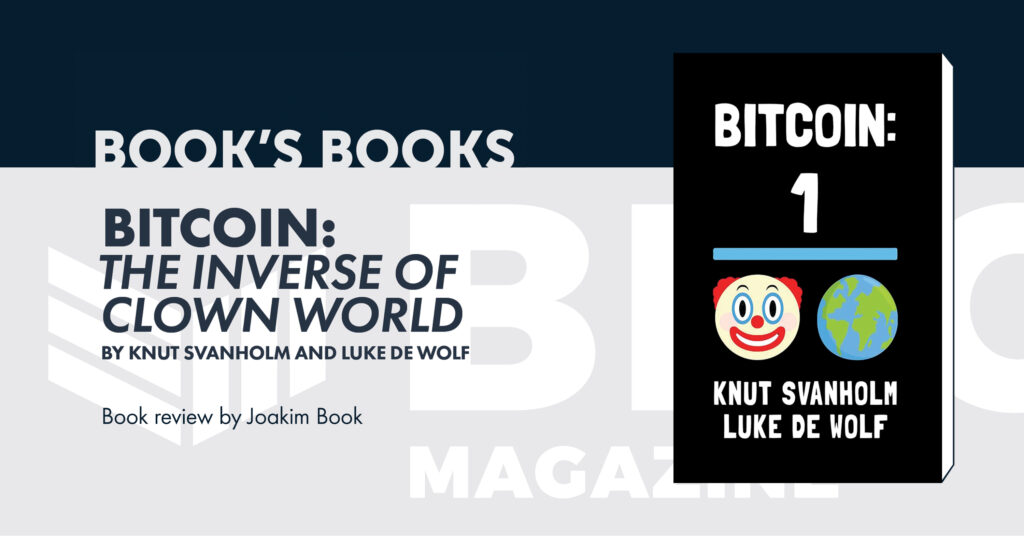Opinion
US Strategic Bitcoin Reserve FOMO Is Being Horribly Oversold
Published
5 months agoon
By
admin
Let’s get one thing out of the way – The United States already holds more bitcoin than any government in the world.

https://x.com/pete_rizzo_/
While this data is true, you wouldn’t exactly know this from the obscene amounts of FOMO being generated by industry lobbyists on social media.
On X, BTC Inc CEO David Bailey, has been pushing for an Executive Order by President Donald Trump that would put this in place on day one, while Satoshi Action Fund founder Dennis Porter has been stoking state-level enthusiasm, pledging to get states active in purchasing before the federal government as some act of patriotic frontrunning.
Look, I’m into the Strategic Bitcoin Reserve. Yes, the United States needs a long-term plan for the dollar, one that finds it (in all likelihood) giving up its status as a global reserve currency.
Yes, the U.S. should be actively boosting the Bitcoin market and industry. But, this sky-is-falling approach just couldn’t be more at odds with all reason.
There are no other governments buying Bitcoin, nor with any (public) plans to. The next largest state holder of Bitcoin is apparently China, which has formally banned its use.
Of the countries that are actively buying Bitcoin with intent – Bhutan has just over 10,000 BTC, while El Salvador is stuck around 6,000 BTC. Neither are going to purchase more Bitcoin than the U.S. government already has – nor does either have a widely popular money printer.
Full stop – even if the U.S. government didn’t buy Bitcoin for a decade, its stockpile would be sizable. Sure, you may argue that it’s about sending a message, about showing leadership in the world, but there are many ways this can be done without blowing political capital.
Is a Strategic Reserve more important than regulation that will actually ease barriers to our industry? That will empower businesses to actually grow the sovereign use of the currency?
Let’s not forget the horrible taxation laws that make bitcoin holders think twice before using bitcoin for purchases..
All this is to say, Strategic Bitcoin Reserve advocates shouldn’t overplay their hand – a lot can be gained just by getting the U.S. government to stop selling the Bitcoin it already has, and there are arguably bigger gains to be had, or at least much worse laws to erase.
Would it be great if the U.S. government started buying Bitcoin? Surely. The industry has political capital to cash in, but let’s use it to spread Bitcoin adoption, not just pump our bags.
This article is a Take. Opinions expressed are entirely the author’s and do not necessarily reflect those of BTC Inc or Bitcoin Magazine.
Source link
You may like


AVAX Falls 2.1% as Nearly All Assets Trade Lower


What is a VTuber, and how do you become one in 2025?


Top Expert’s Update Sets $10 Target


How Academia Interacts With The Bitcoin Ecosystem


AB DAO and Bitget Launch Dual Reward Campaign, Distributing $2.6M Worth of $AB Globally


AI crypto tokens at risk as Nvidia faces restrictions on China exports

Bitcoin: The Inverse of Clown World by Knut Svanholm and Luke de Wolf, Lemniscate Media, 175 pages, $25.00.
This is a book review from The Mining Issue of Bitcoin Magazine Print. Get your copy here.
—
There is a similarity across the Bitcoin books published this [last] summer: They’re all about self-improvement and spiritual development. As a community, we seem to have moved on from writing about what money is, what it used to be, or how it operates in the modern world — or the specific ways in which bitcoin differs.
Instead, we’re now writing and thinking about life with bitcoin. Bitcoin has a culture, its virtues and values push its users in certain directions. [Aleks] Svetski writes about classical virtues and how they let us live well on a bitcoin standard. Mekhail writes about how to raise kids with intention and a long-term, orange, focus. In Bitcoin: The Inverse of Clown World, Knut Svanholm and his podcast sidekick Luke de Wolf gives us “a journey of introspection and self-improvement” (page 11). This “is a book about you” (page 13); not that different from how [George] Mekhail thinks about parenting.
It’s an unbelievably entertaining and powerful book, with plenty of food for thought about the insanities of our world. The chapter headings are slick, the chapters themselves digestible and relatable. If a measure of a book is how often I laugh, pull out my highlighter, or incessantly send quotes to friends, then Inverse of Clown World receives excellent marks. It’s the perfect combination of light, relaxed reading and hard-hitting punch — sprinkled with a whole jar of humor.

The allure of Inverse is to see that all the madness in the world — political grandstanding, gender dysphoria, the broad moral, fiscal, and political decay — call out for an explanation. Why is it happening? How did it come to this? It seems so obviously irrelevant and so obviously stupid.
Svanholm and de Wolf have an answer, which “is more straightforward than you might think. When the money stops working, everything becomes political and a farce” (page 51). Shockingly, the book’s main suggestion is that moral and political collapse is downstream of the money.
Hurling us straight off the deep end, the opening chapter is praxeology — that arcane, philosophical foundation for all Austrian economics. We then venture from the highest echelons of academic economics and mathematics to popular culture interpretations of Christopher Nolan’s The Dark Knight, to observations of reciprocal altruism in nature and its counterpart in human internet affairs. High and low, indeed.
Some dozen pages in, it feels like reading a textbook-like description of markets and the stylized economic hypothetical known as the prisoner’s dilemma. The authors draw important conclusions from the modern debate about that game-theoretical exercise: “[economist Robert] Axelrod’s findings emphasized the importance of being friendly and forgiving, but also appropriately retaliatory” (page 19). “The balance between self-interest and cooperative behavior is crucial in the game of life, where decisions shape futures” (page 21).
What that has to do with Clown World is a little unclear, and indeed we must wait some fifty pages to get an inkling of what precisely the authors mean by the label. Then again, if you’ve read Svanholm before or listened to the Bitcoin Infinity Show at all — or, you know, not been cave-bound for the last decade-plus — you have a pretty good idea.
Several descriptions are broad-stroke, which is understandable when you try to capture something roughly meaning “everything stupid”. It’s the desire for free lunches (page 41). It’s where “pleasing bureaucrats becomes increasingly profitable, while providing as much value as possible to your fellow man becomes increasingly futile” (page 50). Clown World directly follows from a political money, “which makes people focus on totally arbitrary issues” (page 65); indeed, most so-called societal problems aren’t even problems. Clown World is equality-focused (page 101). In contrast, Bitcoin is fair, honest, and meritocratic. At the very end of the book, we learn that “Clown World is a byproduct of people not taking responsibility”. From that definition it quickly follows, via self-reflection and better “mental software”, that “Taking responsibility for your actions is the only thing that can make the whole damn circus disappear” (page 163):
”Success in the Bitcoin world comes from providing value to your fellow human beings, not mass theft or political manipulation. Everything Divided by 21 Million equals the inverse of Clown World.”
There is no doubt in my mind that Clown World is indeed disappearing, pulling away its most ardent proponents and last, bitter beneficiaries kicking and screaming. Messrs Svanholm and de Wolf think something similar:
”things such as Bitcoin ATMs will look as ridiculous as phone booths in the not-too-distant future. […] it’s not only the ATMs that will fall into obsolescence. Everything in the Jurassic fiat currency world is on the brink of extinction. Are you a dinosaur or a human being?”
Between the ridiculing of wokeness and climate change worries, we get plenty of advice about screening out noise and guarding one’s time and mind. We get personal chapters about Knut running through the rainy slush of Gothenburg, Sweden, as well as unbelievably lengthy adventures in the Einsteinian spacetime and astrophysics. The far-fetched relevance to Clown World (“our attention also shapes our realities”, page 113) could have been reached without this much extravagance.
We get musings on creativity, stoicism, and what the relationship is between freedom and responsibility. Indeed, “whatever small step you take to increase your personal freedom footprint increases the total level of freedom dioxide in the atmosphere” (page 133).
Why should you read this book at all? It’s simple, really: It’s Knut, it’s funny, and at times it’s pretty inspiring.
Selected quotes:
- “When people know enough about Bitcoin to have stopped worrying about their financial future, they usually care less about how others perceive their words and actions and more about honesty and integrity” (page 53).
- “In a world where correct pronoun assignments, teenaged weather activists, the big game last night, Taylor Swift’s latest boyfriend, and a mostly harmless flu are headline news, it’s easy to see that some force is trying to avert our eyes from the men behind the curtain” (pages 24-25)
- “Clownish political ideas have existed for as long as politics itself. They come in many ways, shapes, and forms, and it can be hard to see their ridiculousness when living among them” (page 36)
Final nugget:
“You’re an absolute winner if you have one more Satoshi this year than last. Zoom out and be patient. Sell your chairs, slay your heroes, and take responsibility for your actions” (page 63).
Disclaimer: Opinions expressed are entirely the author’s and do not necessarily reflect those of BTC Inc or Bitcoin Magazine.

Source link
Opinion
Crypto’s Biggest Barrier to Adoption? It’s Not Regulation — It’s UX
Published
3 days agoon
April 13, 2025By
admin

As the crypto industry matures, much of the focus remains on regulation, custody, and scalability. But in 2025, the biggest barrier to adoption isn’t policy — it’s user experience. Crypto’s interfaces are still too complex for everyday users. From managing seed phrases to deciphering blockchain transactions, onboarding feels more like navigating a maze than joining a financial revolution. Wallets remain fragmented, unintuitive, and risky.
To reach mainstream adoption, the industry must prioritize usability — making wallets and financial tools more accessible — without compromising the core principles of decentralization. Until then, poor UX will continue to hold crypto back.
Vitalik Buterin’s Call for Account Abstraction
Ethereum co-founder Vitalik Buterin has been one of the most vocal proponents for improving the usability of crypto wallets. His critique centers on the fact that wallets are designed with developers, not end-users, in mind. While technical innovations in blockchain security are advancing, wallets often remain rooted in outdated models that prioritize control over ease of use, leaving the average user overwhelmed and vulnerable to mistakes.
Buterin’s proposed solution (EIP-7702), account abstraction, is a breakthrough concept that could reshape how we interact with crypto assets. Account abstraction allows smart contract functionality to be applied to externally owned accounts (EOAs), the most common type of wallet used in crypto. This would enable more intuitive and flexible security mechanisms, such as social recovery, multi-signature support, and customizable authentication methods, without compromising decentralization or self-custody.
At its core, account abstraction decouples the traditional reliance on a single private key for securing assets, creating the potential for much more user-friendly experiences. Rather than expecting users to memorize long and complex seed phrases or manage multi-step transactions, account abstraction can allow for recovery options, automatic transaction approvals, and even the option to delegate certain actions to trusted contacts — without ever losing ownership of the private keys.
A Call for Human-Centered Design in Crypto
Crypto’s UX problem isn’t just about cleaner interfaces — it’s about rethinking design to prioritize human needs. Historically, tools have been built for power users comfortable with seed phrases and command-line interfaces. But for mass adoption, crypto must serve people who’ve never held a private key.
This is where human-centered design becomes essential. Developers must build wallets and tools that are intuitive, context-aware, and focused on user safety. The shift must move from catering to the technically inclined to empowering everyday users who are new to crypto. To succeed, wallets need to embrace the following core design principles:
- Smart Defaults and Progressive Onboarding: Users should not need to dive into settings or security configurations to get started. Newcomers should be able to start using a wallet with minimal friction, but with built-in guidance and the option to unlock more advanced features as they become more familiar with the space. By providing clear default security settings — such as social recovery options and automatic transaction limits — wallets can offer both ease of use and security from the outset.
- Clear, Intuitive Signing Processes: Transaction signing should be straightforward, with clear explanations of what users are agreeing to. If a user is about to approve a transaction that could drain their wallet, this should be prominently displayed in plain language, not buried under hexadecimal codes or complex jargon. Reducing ambiguity in these interactions will help mitigate the risks of scams and human error.
- Social and Multi-party Recovery Systems: Relying solely on seed phrases as a recovery method is an outdated and risky practice. Instead, wallets should adopt social recovery systems, where users can designate trusted parties to help restore access to their wallet in case of lost keys. This approach not only makes wallets more resilient but also adds a layer of user trust and security.
- Built-In Education and Contextual Help: To truly empower users, crypto wallets need to include educational tools directly within the interface. Contextual prompts, tooltips, and interactive tutorials can help users understand the significance of each action they take, without overwhelming them with dense technical documentation.
- Automation with Control: Features like auto-payment for transaction fees or the ability to batch transactions can make using crypto wallets much more intuitive, especially for newcomers. But these features must be balanced with user control. Users should have the final say over transactions, but automation can help reduce some of the cognitive load that crypto novices experience.
The Future of Crypto Is Usability and Security—Without Compromise
As crypto moves forward, the real challenge will be to reconcile usability with the core tenets of decentralization and security. Innovations like account abstraction are promising, but the industry must continue to prioritize human-centered design. The goal should be to design tools that make crypto accessible, secure, and simple — without sacrificing self-custody or decentralization.
The future of crypto will not be determined by how fast blockchains can scale or how complex DeFi protocols can get; it will be defined by whether the average person can use crypto with confidence. Until then, crypto will remain an exclusive tool for developers and enthusiasts, rather than a technology that empowers the masses.
The question is simple: Can crypto be both intuitive and secure, or will it continue to be a space designed only for the technically proficient? The answer will determine whether crypto achieves its promise of financial freedom for all.
Source link


Disclosure: The views and opinions expressed here belong solely to the author and do not represent the views and opinions of crypto.news’ editorial.
Chinese companies are leading the AI arms race. Chinese politician and computer scientist Lou Qinjian said as much, recently commending DeepSeek for their accomplishments: “DeepSeek adheres to an open-source approach and promotes the widespread application of AI technology globally, which contributes Chinese wisdom to the world,” he said.
“Through the rise of companies like DeepSeek, we can see the innovation and inclusiveness of China’s technological development.”
In February, at the Artificial Intelligence Action Summit in Paris, US Vice President JD Vance made clear where the Trump Administration stands on artificial intelligence. He said that, first and foremost, the Trump administration will ensure that American AI technology remains “the gold standard” worldwide and that US companies remain the partner of choice for international companies and foreign countries.
The Vice President argued that excessive regulation in the AI sector would kill the nascent industry, and that the administration would encourage pro-AI growth policies. “And I’d like to see that deregulatory flavor, making its way into a lot of the conversations at this conference,” he said. Vance also made it clear that AI should be free of ideological bias and that “American AI will not be co-opted into a tool for authoritarian censorship.”
Finally, the Trump administration will safeguard a pro-worker growth path for AI so it can create jobs in the United States. Vance also brought up the notion of foreign adversaries weaponizing AI software to rewrite history, surveil users, and censorship. As Vance stated:
“This is hardly new, of course, as they do with other tech. Some authoritarian regimes have stolen and used AI to strengthen their military intelligence and surveillance capabilities, capture personal data, and create propaganda to undermine other nations’ national security.”
He warned conference attendees against partnering with such regimes. “From CCTV to 5G equipment, we’re all familiar with cheap tech in the marketplace that’s been heavily subsidized and exported by authoritarian regimes,” he said. “But as I know, and I think some of us in this room have learned from experience, partnering with them means chaining your nation to an authoritarian master that seeks to infiltrate, dig in, and seize your information infrastructure.”
Under the hood of DeepSeek
DeepSeek shocked global markets in January with low-cost models that made it seem like US companies were now behind in the AI arms race. The AI lowered the costs of developing reliable AIs, proving itself to be a powerful and cost-efficient open-source language model.
It changed the way we view how much capital and computational resources are needed to develop AI. Researchers across the Western world are now left playing catch-up, studying DeepSeek’s technical advances and social implications.
There are clear benefits to DeepSeek. For instance, startups without the deep pockets of Google and OpenAI can now compete in the AI sector. AI models can do more with less in the post-DeekSeep world. The company claims it took a mere $6 million using 2,000 Nvidia H800 graphics processing units (GPUs) versus the $80 million to $100 million cost of GPT-4 and the 16,000 H100 GPUs needed for Meta’s LLaMA 3.
The Hangzhou-based startup’s AI model employs reasoning capabilities that allow smaller models, whereas other AIs have had to employ larger models. It also uses reinforcement learning, eliminating the need for supervised fine-tuning. Moreover, DeepSeek’s multi-head latent attention (MHLA) mechanism decreases memory usage to 5%, down from 13%, in earlier AI methods.
DeepSeek raises privacy concerns and questions regarding data-sourcing and copyright. DeepSeek is open-weighted, not open source. Open source models share the full source code and data, and open weight models share trained weights but not the code. Therefore, the exact source code used to train the models is not available.
Due to DeepSeek’s open weight model, it is unknown what its sources are. This seems to be the way most AI companies operate. DeepSeek made public its R1 training and open weight models, which will allow other AI developers to copy and build on the model, but not its sources.
DeepSeek and geopolitics
A race for AI dominance between China and the US has come into focus, while Russian capabilities on the matter remain a secret. Sberbank—Russia’s largest state-owned bank—has revealed its intentions to collaborate with Chinese researchers on AI projects. Russia and China, which share what they call a “no limits” strategic partnership, have long talked about AI cooperation—including in military applications—but little is publicly known about its depth or scope.
Sberbank, under CEO German Gref, once a Soviet-style former state savings bank burdened by onerous bureaucracy, is today one of Russia’s leading players in artificial intelligence. It released its GigaChat model in 2023. “Sberbank has many scientists. Through them, we plan to conduct joint research projects with researchers from China,” Sberbank First Deputy CEO Alexander Vedyakhin told Reuters.
As the AI arms race heats up, the benefits of open source innovation come to the forefront. Little flowers bursting through the concrete all around the world, coming up with cool tech that is open-sourced and decentralized.
Manouk Termaaten
Manouk Termaaten is the founder and CEO of Vertical Studio AI.
Source link

AVAX Falls 2.1% as Nearly All Assets Trade Lower

What is a VTuber, and how do you become one in 2025?

Top Expert’s Update Sets $10 Target

How Academia Interacts With The Bitcoin Ecosystem

AB DAO and Bitget Launch Dual Reward Campaign, Distributing $2.6M Worth of $AB Globally

AI crypto tokens at risk as Nvidia faces restrictions on China exports

Coinbase Urges Australia to Vote for Crypto Progress in May

How High Would Pi Network Price Go If Pi Coin Adopts Transparency to Avoid Mantra Pitfalls

XRP’s ‘Rising Wedge’ Breakdown Puts Focus on $1.6 Price Support

China selling seized crypto to top up coffers as economy slows: Report

Ethereum Price Dips Again—Time to Panic or Opportunity to Buy?

The Inverse Of Clown World”

Bitcoin Indicator Flashing Bullish for First Time in 18 Weeks, Says Analyst Who Called May 2021 Crypto Collapse

3iQ and Figment to launch North America’s first Solana staking ETF

Bitcoin Miners Are Selling More BTC to Make Ends Meet: CryptoQuant

Arthur Hayes, Murad’s Prediction For Meme Coins, AI & DeFi Coins For 2025

Expert Sees Bitcoin Dipping To $50K While Bullish Signs Persist

Aptos Leverages Chainlink To Enhance Scalability and Data Access

Bitcoin Could Rally to $80,000 on the Eve of US Elections

Crypto’s Big Trump Gamble Is Risky

Sonic Now ‘Golden Standard’ of Layer-2s After Scaling Transactions to 16,000+ per Second, Says Andre Cronje

Institutional Investors Go All In on Crypto as 57% Plan to Boost Allocations as Bull Run Heats Up, Sygnum Survey Reveals

Ripple-SEC Case Ends, But These 3 Rivals Could Jump 500x

3 Voting Polls Show Why Ripple’s XRP Price Could Hit $10 Soon

Has The Bitcoin Price Already Peaked?

A16z-backed Espresso announces mainnet launch of core product

The Future of Bitcoin: Scaling, Institutional Adoption, and Strategic Reserves with Rich Rines

Xmas Altcoin Rally Insights by BNM Agent I

Blockchain groups challenge new broker reporting rule

I’m Grateful for Trump’s Embrace of Bitcoin
Trending

 24/7 Cryptocurrency News5 months ago
24/7 Cryptocurrency News5 months agoArthur Hayes, Murad’s Prediction For Meme Coins, AI & DeFi Coins For 2025

 Bitcoin3 months ago
Bitcoin3 months agoExpert Sees Bitcoin Dipping To $50K While Bullish Signs Persist

 24/7 Cryptocurrency News3 months ago
24/7 Cryptocurrency News3 months agoAptos Leverages Chainlink To Enhance Scalability and Data Access

 Bitcoin5 months ago
Bitcoin5 months agoBitcoin Could Rally to $80,000 on the Eve of US Elections

 Opinion5 months ago
Opinion5 months agoCrypto’s Big Trump Gamble Is Risky

 Altcoins3 months ago
Altcoins3 months agoSonic Now ‘Golden Standard’ of Layer-2s After Scaling Transactions to 16,000+ per Second, Says Andre Cronje

 Bitcoin5 months ago
Bitcoin5 months agoInstitutional Investors Go All In on Crypto as 57% Plan to Boost Allocations as Bull Run Heats Up, Sygnum Survey Reveals

 Price analysis5 months ago
Price analysis5 months agoRipple-SEC Case Ends, But These 3 Rivals Could Jump 500x


